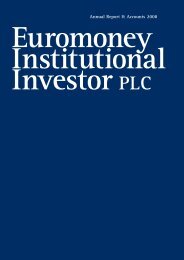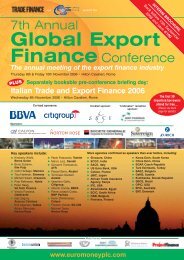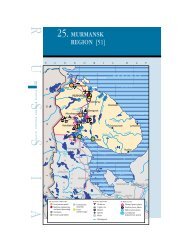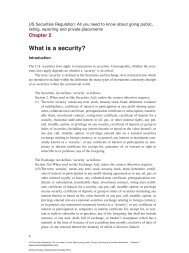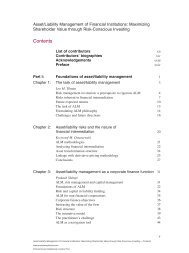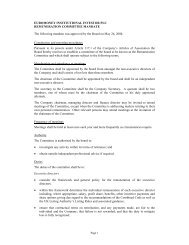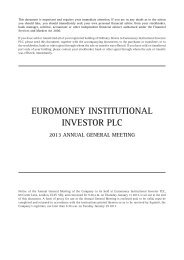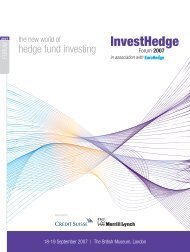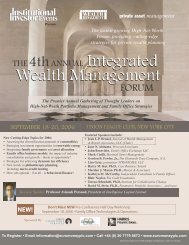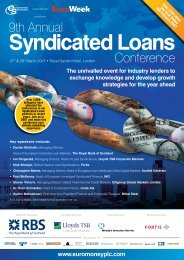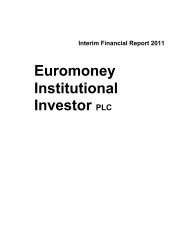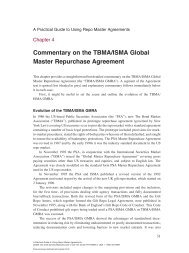Introduction - Euromoney Institutional Investor PLC
Introduction - Euromoney Institutional Investor PLC
Introduction - Euromoney Institutional Investor PLC
- No tags were found...
Create successful ePaper yourself
Turn your PDF publications into a flip-book with our unique Google optimized e-Paper software.
Copyright of <strong>Euromoney</strong> <strong>Institutional</strong> <strong>Investor</strong>rental income from a building the owner must assume responsibilities for the externalmaintenance of the building as with an ijara operating lease.Profit is also seen as a justifiable reward in Islamic finance, which rather than beingrelated to work or ownership, is compensation for risk sharing. In business and financethere are always risks including credit, market and operational risk, but if risks are sharedbetween the parties this is more just than simply assigning all the risk to a single party.With conventional lending the borrower assumes all the risk, and is penalised further forpayment delays or defaults. In contrast in Islamic finance the risks are shared between thebank and the client. Of course Islamic banks have to manage credit risk, andunscrupulous defaulters should not be treated leniently, otherwise moral hazard problemsmight arise.Misselling of financing products is clearly immoral, as with the sub-prime mortgages inthe United States and to a lesser extent the United Kingdom, where borrowers wereencouraged to take on debts they could not afford by mortgage brokers and bank salesteams who earned up-front fees for each mortgage sold. When the inevitable defaultsoccurred this was of no concern to the mortgage brokers and sales teams who had movedon to other activities. Islamic banks have to adopt fair and transparent charging structureswhich do not exploit the ignorance of the client. Their staff must ensure as far as possiblethat clients can meet their financial obligations. So far the record of Islamic homefinancing has been favourable, with none of the defaults that have characterised the subprimecrisis.Islamic finance is inherently participatory with the financier getting involved with theclient and taking an interest in how the funding is utilised. This is not only to ensure thefinancing is serving a moral purpose, although that is important, but also to help the clientmanage the funds received effectively. The financier can act as an agent for the client, aswith murabahah where the financier purchases a good on behalf of the client and re-sellsit to the client for a mark-up which makes the transaction profitable. What justifies themark-up is the ownership responsibilities exercised by the bank, which serves as a trader4
Copyright of <strong>Euromoney</strong> <strong>Institutional</strong> <strong>Investor</strong>arrangement costs. Whereas murabahah financing was typically for periods of three toeighteen months, ijara contracts were for three to five years. Of course with ijarafinancing, liquidity was reduced and risks increased with the longer period to maturity,but this could be built into the rental to provide an attractive risk and return profile forthis category of asset.Financial engineering involving shariah-based productsThe 1990s witnessed further product development involving both short term receivablesfinancing using salam and longer term project finance with istisna. Salam involvesmaking a pre-payment for a good to be delivered in the future, usually after ninety days.As an up-front payment is made, the price paid will usually be at a discount to theanticipated spot price on delivery. The effect is similar to a forward transaction where theprice is guaranteed. Salam contracts cannot be traded, as such activity would bespeculative; rather it can be regarded as a hedging instrument. To increase liquidity,however, a bank can enter a parallel or reverse salam contract, under which thecommodity or good will be delivered to a third party after, for example, sixty days. Asthe period is shorter to delivery, the third party will pay a higher price for the contract,the difference between this and the initial purchase price representing the bank’s marginor profit.Istisna finance can be for periods of five years or more with this traditional method offinancing manufacturing being adapted to cover projects. Often an investment bank isinvolved as it covers payments by the project management company for supplies andwage costs. Once the project is completed it is handed over to the operating companywhich pays the project management company. This revenue can then be used to repay theinvestment bank. Rather than having an illiquid asset for a five-year period or longer, theinvestment bank may enter a parallel istisna agreement to sell the right to the repaymentto one or more Islamic banks or investment companies. This creates smaller tranchessuitable for investors who want to place millions of dollars rather than billions. Rather6
Copyright of <strong>Euromoney</strong> <strong>Institutional</strong> <strong>Investor</strong>than having a single large investment in a potentially high risk project where there couldbe cost overruns or delays in construction, the Islamic banks and investment companiesmay prefer to have a diversified portfolio of istisna assets to spread risk.The preponderance of Islamic retail bankingMost Islamic banking is retail rather than involving investment banking, with employeeshaving their salaries paid into current accounts where the funds are restricted to financingshariah compliant activities conducted without riba. Those with savings are encouragedby Islamic banks to open unrestricted investment mudarabah accounts which enablesthem to share in the bank’s profits or restricted mudarabah accounts where the depositsare used for a specific project and the depositor shares in the profits from the project. Thelatter usually produces a higher return, but the risks from concentration are greater. ManyIslamic banks have been promoting these accounts, which have proved popular withclients worldwide.Retail banking products include car and housing finance, with the former usuallyinvolving murabahah or ijara and the latter ijara wa iqtina, a hire purchase contract, ordiminishing musharakah. With diminishing musharakah the client and an Islamic bankform a partnership, with the client providing ten per cent or more of the capital and theIslamic bank ninety per cent or less. This initial funding is used to purchase a property.Each year the client buys out part of the bank’s share in the partnership, creating arepayments stream, with the client’s share in the partnership gradually increasing. Theclient also pays rent for the share the bank owns. If each repayment instalment was equalthis would front-load the payments obligations of the client, as they have to make largerrental payments at the start to reflect the bank’s higher ownership share. In order to avoidthis scenario the repayments are usually structured exponentially with lower repaymentsinitially but higher repayments later. This may suit younger home buyers whose incomewill increase with career progression. It is worth noting that the property is not re-valuedduring the life of the financing. The client enjoys all the capital gain on the property if the7
Copyright of <strong>Euromoney</strong> <strong>Institutional</strong> <strong>Investor</strong>market is rising. The bank only has its initial funding repaid, its gain accruing from therent. Arrangement and management costs are covered by set up charges and theadministrative fees. In other forms of musharakah all parties share in any capital gains orlosses, but this is not acceptable to most property buyers who anticipate long-term assetappreciation.Shariah-compliant capital market productsThe major development in Islamic finance in the last decade has involved the issuance ofsukuk Islamic securities and a methodology for ensuring that equity investment can beshariah compliant.Sukuk are based on Islamic financing structures such as salam, murabahah, ijara,mudarabah and musharakah which are securitised so that apart from salam sukuk, theycan be traded in a market. All sukuk must be asset backed to be shariah compliant andhence buyers and sellers are not merely trading financial instruments but a title to a realasset such as piece of real estate, buildings or equipment. Salam sukuk are similar totreasury bills but provide a mark-up for the investor rather than interest. Unlike treasurybills they cannot be traded as indicated above, as the asset is only delivered in ninety dayswhen the sukuk matures and is not in possession of the investors. Murabahah sukuk havea fixed return and correspond to bonds, while with ijara sukuk returns vary which meansthey have the financial characteristics of floating rate notes. These have proved the mostpopular type of sukuk, not least because returns usually vary in line with changing marketfunding costs.The main concerns of shariah scholars with sukuk is that the investors have a clear title tothe underlying asset and that in the case of mudarabah and musharakah the assetsthemselves are re-valued so that the investors do not merely get the nominal value oftheir investment refunded as with a debt instrument. This creates a dilemma for theinvestors, as those wanting shariah-compliant debt instruments do not wish to invest in8
Copyright of <strong>Euromoney</strong> <strong>Institutional</strong> <strong>Investor</strong>assets subject to market risk, their preferred exposure being to default risk only. TakafulIslamic insurance operators, for example, cannot take too much exposure to market risk,as although a proportion of their holdings are in equities, most are in sukuk for the samereasons as insurance companies hold bonds and floating rate notes. If there wereexcessive holdings of equity instruments and the market value of these investments fell,takaful operators would no longer be able to fulfil their obligations to those policyholdersmaking claims. This would mean a breach of contract and would be unfair to those inneed of accident or other compensation. Those who argue for all sukuk being equitybasedneed to be aware of the wider social and legal consequences. Land or buildingsmay be used as the underlying assets for sukuk, but investors wanting exposure to realestate may prefer to invest directly in this rather than in sukuk. From a portfolioperspective sukuk have to be viewed as one component of a multi-asset allocationstrategy.Implications of financial market volatility for IslamicinvestmentSukuk issuance has increased enormously since 2000, with over 200 issues in 2007 aloneworth $45 billion. Much of the activity was in the first seven months of the year however,as sukuk issuance after August was adversely affected by the crisis in securitized debtobligations resulting from the sub-prime defaults. The pricing of sukuk has been linked tothat of conventional debt securities, as sukuk represents only a small proportion of theoverall market, and therefore sukuk issuers and investors are price takers rather than pricemakers. The higher price which needs to be offered for sukuk financing has deterredmany issuers, with funding plans either abandoned as projects are rethought, orpostponed until market conditions become more certain.The slow-down applied especially to US dollar denominated sukuk, the currency for mostsub-prime debt, but issuance in other currencies has been affected less. Malaysian sukukare mostly local currency denominated, and appear to be unaffected, and in the Gulf there9
Copyright of <strong>Euromoney</strong> <strong>Institutional</strong> <strong>Investor</strong>has also been a trend in favour of local currencies. Only the Kuwaiti dinar has beenallowed to appreciate against the US dollar so far, but investors in riyal- or dirhamdenominatedsukuk are expecting that these currencies are likely to be decoupled from theUS dollar, possibly in 2010 when a new joint float might occur as part of a move towardsmonetary union in the Gulf Co-operation Council states. It is likely in any case that therewill be increasing currency diversification in sukuk issuance. The British government isplanning a series of sterling denominated sovereign sukuk issues, the pricing for whichwill provide a benchmark for subsequent sterling corporate sukuk issuance from London.There have already been several euro-denominated sukuk, including on behalf of theGerman state government, and many more are likely in the years ahead.The volatility in equity markets worldwide does not seem to have constrained investorinterest in shariah-compliant managed funds. By 2008 there were over four hundred ofthese funds, most of which were equity based, although there were also 50 specialisedreal estate funds. Investment in equity is permissible, as long as the companies areinvolved in acceptable business activities and have limited debt based leverage. Amethodology has been developed to ascertain what is permissible by institutions such asthe Dow Jones Islamic Indexes. Ideally any company involved in interest-basedtransactions, especially conventional banks, should be excluded but the guidelinesrecognise that most companies may have some interest-based income and obligations.Borrowing up to one third of capital is permissible in line with the discretionary limits inIslamic inheritance law, but beyond that the financing is regarded as highly speculativeand therefore not allowed.The future for Islamic financeA browse through this encyclopedia demonstrates how wide ranging the areas covered byIslamic finance have become. The scope extends to banking regulation and riskmanagement as well as corporate and shariah governance. The coverage also includestakaful and wealth management, as well as retail open and closed funds. Productinnovation is also discussed, as are tax issues and the role of Islamic finance in offshore10
Copyright of <strong>Euromoney</strong> <strong>Institutional</strong> <strong>Investor</strong>centres. Aly Khorshid has succeeded in attracting an excellent group of contributors whoare the leading academics and professionals in the field of Islamic finance and the readercan benefit from their knowledge.The future will of course be determined partly by the choices made today, and in thisIslamic finance is no exception. Being shariah compliant is not simply a substitute forbeing shariah based; rather they represent different directions for Islamic productdevelopment. The industry is also changing as the economies of the Muslim worldevolve. Some remain poor and underdeveloped, but many are highly developed and playan increasing role in the global economy, enhancing the prospects for Islamic finance.Some observers see a type of Islamic capitalism developing based on riba-free financewhich challenges the assumptions underlying western capitalism. There is an ideologyimplicit in Islamic finance that may ultimately shape the development of global finance,not least because there is increasing worldwide concern with moral and ethical issues andnot simply with making money and material advance.11



